When applying for a loan or credit in India, lenders scrutinise your credit report to assess your creditworthiness. Understanding the elements that lenders focus on can help you manage your credit profile more effectively and increase your chances of securing favourable terms.
Want a personal loan easily? Get an instant loan from Airtel Finance with the Airtel Thanks app. The lowest interest rates, lower processing fees, and more allow you to get a loan in just no time!
Understanding Credit Reports in India
What Is a Credit Report?
A credit report is a detailed record of an individual’s credit history, maintained by credit bureaus. In India, the major credit bureaus include TransUnion CIBIL, Experian, Equifax, and CRIF High Mark. These agencies collect and compile information from various financial institutions to generate a comprehensive report that reflects your credit behaviour.
Importance of Credit Reports for Lenders
Credit reports are crucial for lenders as they provide an in-depth view of a borrower’s creditworthiness. By examining a credit report, lenders can evaluate the risk associated with lending money to an individual. A strong credit report can lead to quicker approvals and better loan terms, while a poor report can result in higher interest rates or outright rejections.
Read more: Ways to check your credit score online
Key Factors Lenders Examine
Credit Score
One of the first things lenders look at is your credit score, a three-digit number that summarises your creditworthiness. In India, the CIBIL score is the most widely used, ranging from 300 to 900. A higher score indicates better credit health. Generally, a score above 750 is considered good and increases your chances of loan approval with favourable terms.
Payment History
Your payment history is a critical component of your credit report. Lenders scrutinise this section to see how reliably you have repaid past debts. This includes:
- On-time payments: Consistently making payments on or before the due date positively impacts your credit score.
- Late payments: Payment delays can significantly harm your score.
- Defaults: Any defaults or write-offs are major red flags for lenders.
Credit Utilisation Ratio
The credit utilisation ratio represents the percentage of your available credit that you are currently using. Lenders prefer a lower ratio, as it indicates responsible credit usage. A high ratio suggests that you may be over-reliant on credit, which can be a risk factor.
Length of Credit History
The length of your credit history also plays a vital role. A longer credit history provides more information about your borrowing and repayment behaviour, helping lenders make a more informed decision. This includes the age of your oldest account, the average age of all your accounts, and the age of your newest account.
Read more: Income impacts on your credit score – personal loan
Types of Credit Accounts
Secured vs. Unsecured Credit
Lenders examine the types of credit accounts you have, distinguishing between secured and unsecured credit. Secured credit, such as home loans or auto loans, is backed by collateral. Unsecured credit, like personal loans and credit cards, is not backed by any asset. A mix of both types of credit can positively impact your credit score, demonstrating your ability to manage different forms of debt.
Number of Credit Accounts
The number of credit accounts you hold also matters. While having multiple credit accounts can be beneficial, opening too many accounts in a short period can be a red flag for lenders. It may indicate a higher credit risk due to the potential for accumulating significant debt quickly.
Read more: How to maintain a healthy CIBIL score?
Recent Credit Activity
New Credit Inquiries
When you apply for new credit, lenders make a hard inquiry on your credit report. Multiple hard inquiries within a short period can negatively impact your credit score, as they may indicate that you are in urgent need of credit or overextending yourself financially.
Recent Loan Applications
Lenders review your recent loan applications to understand your current credit-seeking behaviour. Applying for multiple loans in a short time can be seen as a sign of financial distress, which may reduce your chances of loan approval.
Public Records and Collections
Bankruptcies
A bankruptcy record is a significant red flag for lenders. It indicates that you have previously been unable to meet your debt obligations and had to resort to legal relief. This can severely impact your ability to obtain new credit.
Collections and Charge-offs
Accounts that have been sent to collections or charged off due to non-payment are also scrutinised. These records indicate serious delinquencies and can drastically lower your credit score. Lenders are wary of extending credit to individuals with such records.
FAQs
How often should I check my credit report?
It is advisable to check your credit report at least once a year to ensure all information is accurate and to identify any potential errors or fraudulent activity.
How can I improve my credit score?
Improving your credit score involves making timely payments, reducing your credit utilisation ratio, maintaining a diverse mix of credit accounts, and avoiding multiple loan applications in a short period.
Do soft inquiries affect my credit score?
No, soft inquiries, such as checking your own credit report or pre-approved loan offers, do not affect your credit score. Only hard inquiries made by lenders during the credit application process can impact your score.
Can I remove negative information from my credit report?
Negative information, such as late payments or defaults, can remain on your credit report for up to seven years. However, you can dispute any inaccuracies with the credit bureaus to have incorrect information removed.
How long does it take to rebuild credit after a negative event?
Rebuilding credit after a negative event can take time, typically several months to years, depending on the severity of the event and your subsequent credit behaviour. Consistently practising good credit habits is essential for recovery.
Read more: Personal loan for CIBIL score of 550
Understanding what lenders look for on your credit report in India can help you take proactive steps to maintain or improve your credit health. By managing your credit responsibly and addressing any issues promptly, you can enhance your chances of securing loans with favourable terms and build a solid financial foundation.



